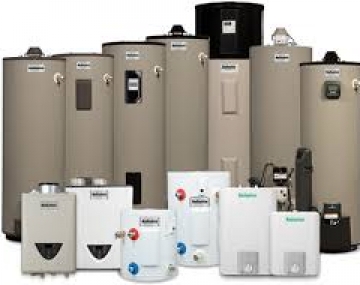Water Heaters
A perfect example of something that is taken for granted – the water heater. We need it functioning in tip-top condition and when it doesn’t, that’s a cold shower. Most homes will contain a tank-type water heater. It is a big, cylindrical tank with pipes attached to it. If there is no tank in the home, then the water is likely heated via the boiler that heats the home and can reach the taps to supply hot water. A standard heater is available in either an electric option or fuel-fired. If it is the latter, oil-fueled heaters are the most common.
The job of a water heater is to not only heat the water, however. Perhaps even more important, and especially if the heating process fails at some point, is being able to store the water until it is ready to be used. Most tanks as a result are equipped with insulation which aids in keeping the water warm between the various cycles. Here’s a quick review of the most popular types of heaters on the market.
Storage Tank Water Heater
The most common and discussed briefly above, the tank is insulated where the water is stored and heated. When needed, the water departs from a pipe on the top of the heater and there is a temperature and pressure-relief valve which monitors this process. A natural gas water heater will use less energy but does cost more at the time of purchase. However, over the long-term it more than justifies that extra upfront cost.
Tankless Water Heater
Also known as “on-demand,” rather than storing the water a tankless heater calls upon coils to heat the water “on-demand” – when you need it. Much more energy efficient for obvious reasons, a sticking point is they only provide a limited flow (3.5 gallons) of hot water per minute. Tankless heaters are ideal for folks who are not using hot water for more than simply one use at a time. For example, taking a shower and running the dishwasher.
Heat Pump Water Heater
These are hybrid heaters that take in heat (via the air) and subsequently transfer it to the water. Very energy efficient, heat pump heaters use roughly 60% less energy than a typical electric heater, and like the natural gas heater they cost more but pay that extra money back over the long-term. An important consideration, these do not work well in very cold spaces and are ideal for temperatures that do not exceed 40 to 90 degrees Fahrenheit.
Solar Water Heater
Lastly, the solar water heater is making big moves as of late, especially in climates that receive tons of natural light. Like a solar panel does, the absorbed heat is transformed into a fluid (like antifreeze) within a closed loop system that runs into the tank. Even considering federal and local rebates however, the costs are still rather high. Savings will arrive, but you might need to wait up to 30 years to recoup said costs.
These are the main types of heaters but there are other, alternative models entering the market every year. It’s a “hot” item these days, keeping you heated is big business!


Comments:
Login to leave a reply